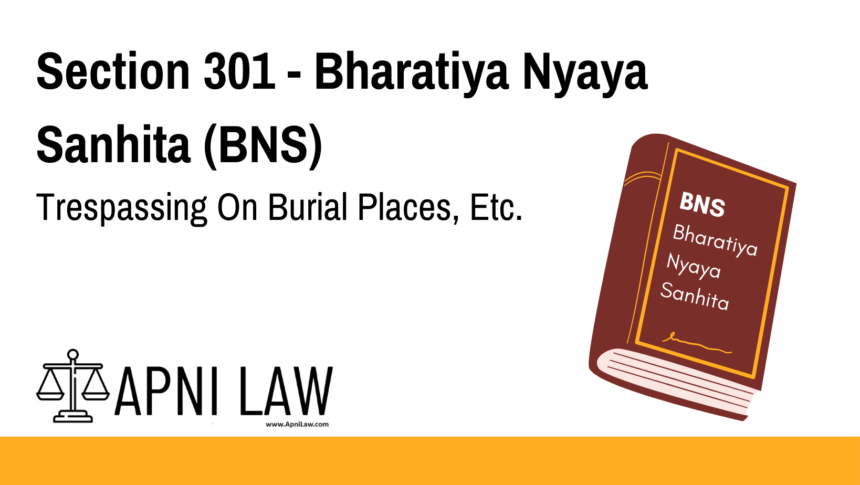Code: Section 301 BNS
Whoever, with the intention of wounding the feelings of any person, or of insulting
the religion of any person, or with the knowledge that the feelings of any person are likely to
be wounded, or that the religion of any person is likely to be insulted thereby, commits any
trespass in any place of worship or on any place of sepulchre, or any place set apart for the
performance of funeral rites or as a depository for the remains of the dead, or offers any
indignity to any human corpse, or causes disturbance to any persons assembled for the
performance of funeral ceremonies, shall be punished with imprisonment of either description
for a term which may extend to one year, or with fine, or with both.
Explanation of Section 301 BNS
Section 301 of the Bharatiya Nyaya Sanhita (BNS) is designed to protect the sacredness of burial places, places of worship, and funeral rites. It seeks to prevent actions that cause emotional distress, insult religious sentiments, or disrupt peaceful mourning.
This law is essential for maintaining religious harmony and respecting the dignity of the deceased.
Illustration
Example 1: Trespassing on a Cemetery
A person illegally enters a cemetery with the intention of causing disturbance to the family mourning their loved one. This act can be punished under Section 301.
Example 2: Disrespecting a Corpse
Someone deliberately damages or disrespects a corpse during a funeral ceremony. This is a punishable offense.
Example 3: Disrupting a Religious Funeral
A person creates a loud disturbance during a religious funeral ceremony, shouting offensive remarks. This act can lead to prosecution under this section.
Common Questions and Answers on Section 301 BNS
1. What kind of places does this section apply to?
- Answer: It applies to:
- Places of worship,
- Cemeteries,
- Funeral homes,
- Any place designated for funeral rites.
2. Can someone be punished for unintentionally disturbing a funeral?
- Answer: No. The section specifically targets intentional acts. Unintentional disturbances without the purpose of causing harm or insult are not covered.
3. What kind of punishment can be expected?
- Answer:
- Up to 1 year imprisonment, or
- A fine, or
- Both imprisonment and fine.
4. Is this section applicable to both religious and non-religious funeral ceremonies?
- Answer: Yes, it applies to all funeral ceremonies, regardless of religious affiliation, as long as the ceremony is lawful and dignified.
Conclusion
Section 301 BNS plays a vital role in safeguarding the dignity of the dead and the emotions of the grieving. It also helps maintain peace and respect in places that hold religious or cultural significance.
The section reinforces the principles of human dignity, religious tolerance, and respect for all faiths.








